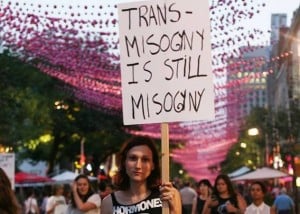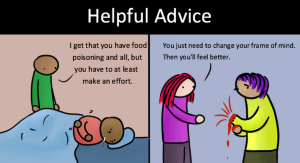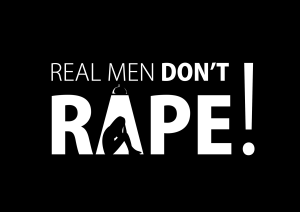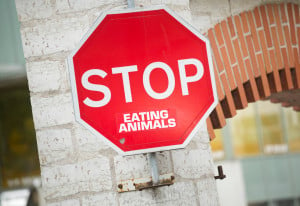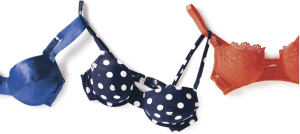
SHD
Full disclosure: I am kind of a curvy lady. I say kind of because there are many ways in which I can pass as thin.
I can shop wherever I want and no one would charge me extra for an airplane ticket. But my jeans come in double digits, and my doctor recently told me that I am a “good candidate” for a weight loss program (Thank you! I only wanted a flu shot, but wow, how thoughtful!).
Depending on the circumstance, I either enjoy thin privilege or feel fat shamed.
I am aware that I am lucky to experience reprieves from the fat shaming. Many people do not have that luxury, and speak beautifully about that.
But I am here to contribute to the conversation, using my voice as an in-betweenie.
Here is something else about me – I am a runner. I love to exercise. It makes me feel good!
My morning run helps me to wake up before work, and my nightly yoga class helps me to unwind after a long day. I’ve recently tried to save money on bus fare by riding my bike to work, and my favorite way to bond with my dog is to go for long walks.
As someone with a history of depression, exercise helps me to regulate my moods and helps me to fall asleep at night. It helps me to feel powerful and strong and has helped to repair my traumatized and eating disordered relationship with my body.
My body is capable of so much – and so am I.
But being a kind-of-curvy lady poses some challenges at the gym, where is where I do most of my exercising.
Most people assume that I’m there for the sole purpose of losing weight and would never consider that I might be there to take care of my body.
Just yesterday, a man told me that over the past few weeks he has been watching me run on the treadmill, and that if I’m wondering why I haven’t lost any weight, it’s because pure cardio doesn’t burn enough fat.
This interaction really embodies all of the struggles that I face as a kind-of-curvy lady who also loves to exercise.
He not only assumed that I was looking for unsolicited feedback concerning my exercise preferences and routine, but he made the unilateral assumption that as a kind-of-curvy lady, I was only on the treadmill to lose weight.
The assumption that someone with curves would only exercise to lose weight is really harmful and hurtful.
It completely negates what we already know – that self care is a vital piece of survival and that bullying people into weight loss doesn’t work.
Study after study has shown that there are more effective ways to measure health than to just focus on someone’s weight and/or BMI.
And yet, when we talk about health, we usually discuss it in terms of these numbers.
But really, health and being healthy means so much more.
We need to move the conversation around exercise away from weight loss and shift the focus onto health and wellness.
How many times have we all seen exercise products marketed as weight loss products? Hand weights are sold as ways to tone and trim our arms. Gym memberships are marketed as ways to slim down, to lose the holiday weight.
We exist in a culture that conflates health with thinness.
There’s something underneath all of this weight loss centered bologna: the fear of fat bodies, and especially, the fear of fat women’s bodies.
Women are not supposed to take up metaphorical or physical space or have a body that doesn’t exist for the pleasure of the male gaze.
So that act of having a body that is big/fat/curvy is itself a radical act.
And we know how scared folks get when we act radically.
But there’s a problem with all of this. Even though I love my body and appreciate it, I, too, fall into the toxic trap of body shaming.
On particularly difficult runs, my mind often goes to a place of shaming my body. I often find myself saying that if only I were thinner, it would be able to run farther, faster.
I am new to biking and instead of gently reminding myself that a new muscle group needs to develop, I chastise myself for being weak.
To push myself when I’m struggling during a workout, instead of gentle encouragement, I often resort to fat shaming myself.
For as feminist as I am, and for as committed to appreciating every body at every size, and as interested as I am to redefining my own understanding of health, I too fall into the trap of shaming my body for having flesh and weight.
And my guess is that I’m not alone, even in a community like Everyday Feminism, where we are all committed to treating ourselves and each other with loving kindness.
So here are some ways to get into a loving frame of mind toward your body and exercising:
1. Be Kind To Your Body
Appreciate what it can do, including things you don’t even notice – whether that means running a marathon, moving you to where you want to go, metabolizing your food, to protecting your from germs.
Your body can do something for which you can feel proud.
When you feel yourself starting to pick on an aspect of your body that you dislike, see what happens when you stop yourself and replace the hateful words with loving words.
2. Loudly Celebrate the Body That You Do Have
Your body, flawed as it might be, is perfect. Declare it to yourself and then declare it to the people who you love.
When we all get really, really good at telling ourselves and our loved ones that we are capable and beautiful, we will (someday, I promise) be really good at telling the same truth the people around us who think we only exist to lose weight.
Find power in speaking the truth that your body is good enough.
3. Decide What Health and Fitness Mean To You
Health and fitness are important. Too often, people think that the fat acceptance movement is about encouraging people to stop caring about their health.
In fact, the opposite is true.
We must begin to imagine health as a complex picture that is made up of many elements – with weight being but one small piece. Rather than consider the number on the scale, we should consider the subjective nature of health.
When I was as thin as the world tells me that women should be, I couldn’t walk up a flight of stairs without getting winded. My best friend is even thinner than that and is an avid runner.
Now as a kind-of-curvy lady, I can run for miles without feeling as winded as I once did.
Two body shapes, two experiences of health and fitness.
The point is that health means something different to everyone, and size is not what solely determines the experience of health.
4. Share That You Exercise Out Of Self-love And Not To Lose Weight
The most common assumption is that people who exercise do so to lose weight. But that is not the experience of everyone who exercises.
A lot of us do it just because it feels good.
There are probably people who think that I should exercise to lose weight, or who would be confused that I love my body enough to treat it well with exercise.
We have trouble understanding why someone who isn’t a size 2 could love their body.
In order to change these misguided notions, we have to talk about it.
When you tell your friend that you’ve started Zumba and she replies by sharing that her cousin lost 50lbs that way, tell her that you like Zumba because it’s fun and sexy, not because it can help people to lose weight.
5. Find a Community of People Who Also Love Their Bodies
There are so many people in the world who feel that they need to be secretive about their love for their bodies.
Let’s face it: it’s just not cool to be a woman who doesn’t hate her thighs.
But these people do exist, I promise. Search for these communities in your life and online.
Feminist circles are often a good place to start, but there are countless other ways to meet people who also take pride in exercising for fun.
The most important thing to remember is that we each deserve the kindness that we dole out so effortlessly to others. If I would never encourage a kind of-curvy friend by fat shaming her, why would I do that to myself?
We all have the right to exercise for enjoyment and health benefits, regardless of our size.
[do_widget id=”text-101″]
Sarah Ogden Trotta is a psychotherapist at ContactLifeline, Delaware’s Rape Crisis Center. She can be reached at [email protected]. Follow her on Twitter @xsogden. Read her articles here.
Search our 3000+ articles!
Read our articles about:
Our online racial justice training
Used by hundreds of universities, non-profits, and businesses.
Click to learn more





